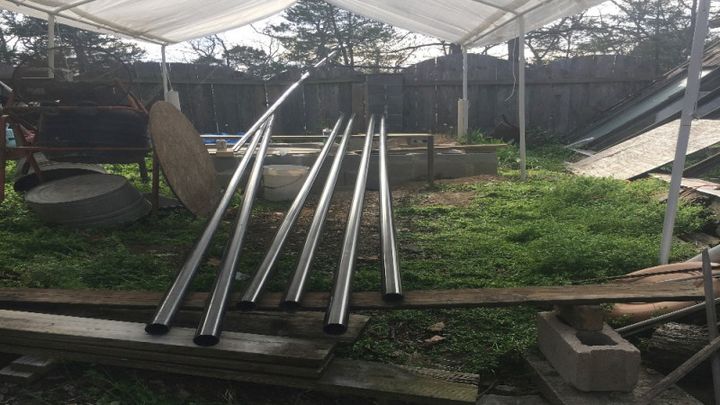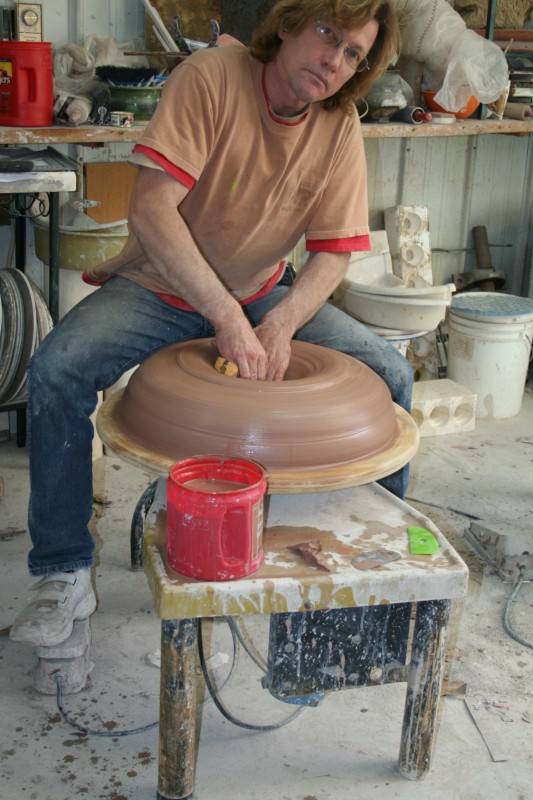
Big Pot USA
Donation protected
Making the world's biggest ceramic pot ever turned by hand on a potter's wheel.
To achieve the world's tallest hand-turned ceramic pot the piece must be over 21 feet tall, requires modified equipment and lots of clay.
Initially this project, "Big Pot USA," requested outside funding resources of $27,500 (2014) and this has been revised to $16,000 by Wallace's personal contribution of material, supplies and work during which time a mere $280 trickled in. "I am very grateful to those who contributed".
The first phase which is nearly completed includes the design and construction of the specialized equipment needed to turn with variable speed control over a ton of clay. Wallace has re-designed the pottery wheel (a turn-table machine) to withstand the overall weight of the clay. The next step is to enclose the work area with a tall narrow "shed" to keep out rain, snow and enable heating to prevent the clay from freezing while the work continues. When ready to fire the dried pot will remain in place on the pottery wheel's platter (insulated with firebrick) will also serve as the floor of the kiln for firing the giant pot.
"Normally, you form the clay on a pottery wheel, move the formed pot to a shelf to dry and then move it to a kiln. A very large piece made of dry clay is actually quite fragile and risks breakage by any attempt to pick it up and move it." The pot could take several weeks, even months, to form, dry and fire depending on weather conditions. The announcement of the firing date will be sent out here, on the Facebook site and on Twitter. Successful results in pottery are not guaranteed with every attempt and so it may be necessary to have sufficient funding for additional clay and fuel for subsequent attempts. Once the pot is successfully fired then it can be moved to a gallery, art center or a new home. Depending on the location some logistical planning will be required to rotate the pot horizontally when loaded on a truck or trailer to pass under overhead utility lines.
Funding is needed for clay, insulation bricks and fiber, scaffolding, structural steel and sheet metal, fuel, concrete, welding, fuel lines & fittings and burners.
At the outset of this campaign the record was thought to be held by South Korea in the form of a clay vessel standing eight feet tall and 5.5 feet in diameter. More recently Guiness Book of World Records reported the world's tallest pot (over twenty feet) was produced in 2005 by a three-man team in Taiwan. Neither of these giants were wheel-turned that we can be sure of. It can be concluded that these were made by a "coil and paddle" method where the pot is not turning while being formed. Regardless of various means and measurements, Guiness has limited the scope of this category to consider only the height of the pot . . . not the volume, girth, method of forming the clay or means of firing the pot.
Corporate sponsorship is welcome for this project as well as individual contributions. Names of the donors will be engraved into the side of Big Pot for posterity (or withheld at donors' request). Additional rewards listed below include a limited edition of smaller pots (jars) made as studies for the big pot.

To achieve the world's tallest hand-turned ceramic pot the piece must be over 21 feet tall, requires modified equipment and lots of clay.
Initially this project, "Big Pot USA," requested outside funding resources of $27,500 (2014) and this has been revised to $16,000 by Wallace's personal contribution of material, supplies and work during which time a mere $280 trickled in. "I am very grateful to those who contributed".
The first phase which is nearly completed includes the design and construction of the specialized equipment needed to turn with variable speed control over a ton of clay. Wallace has re-designed the pottery wheel (a turn-table machine) to withstand the overall weight of the clay. The next step is to enclose the work area with a tall narrow "shed" to keep out rain, snow and enable heating to prevent the clay from freezing while the work continues. When ready to fire the dried pot will remain in place on the pottery wheel's platter (insulated with firebrick) will also serve as the floor of the kiln for firing the giant pot.
"Normally, you form the clay on a pottery wheel, move the formed pot to a shelf to dry and then move it to a kiln. A very large piece made of dry clay is actually quite fragile and risks breakage by any attempt to pick it up and move it." The pot could take several weeks, even months, to form, dry and fire depending on weather conditions. The announcement of the firing date will be sent out here, on the Facebook site and on Twitter. Successful results in pottery are not guaranteed with every attempt and so it may be necessary to have sufficient funding for additional clay and fuel for subsequent attempts. Once the pot is successfully fired then it can be moved to a gallery, art center or a new home. Depending on the location some logistical planning will be required to rotate the pot horizontally when loaded on a truck or trailer to pass under overhead utility lines.
Funding is needed for clay, insulation bricks and fiber, scaffolding, structural steel and sheet metal, fuel, concrete, welding, fuel lines & fittings and burners.
At the outset of this campaign the record was thought to be held by South Korea in the form of a clay vessel standing eight feet tall and 5.5 feet in diameter. More recently Guiness Book of World Records reported the world's tallest pot (over twenty feet) was produced in 2005 by a three-man team in Taiwan. Neither of these giants were wheel-turned that we can be sure of. It can be concluded that these were made by a "coil and paddle" method where the pot is not turning while being formed. Regardless of various means and measurements, Guiness has limited the scope of this category to consider only the height of the pot . . . not the volume, girth, method of forming the clay or means of firing the pot.
Corporate sponsorship is welcome for this project as well as individual contributions. Names of the donors will be engraved into the side of Big Pot for posterity (or withheld at donors' request). Additional rewards listed below include a limited edition of smaller pots (jars) made as studies for the big pot.
Organizer
Jim Wace Wallace
Organizer
Eureka Springs, AR